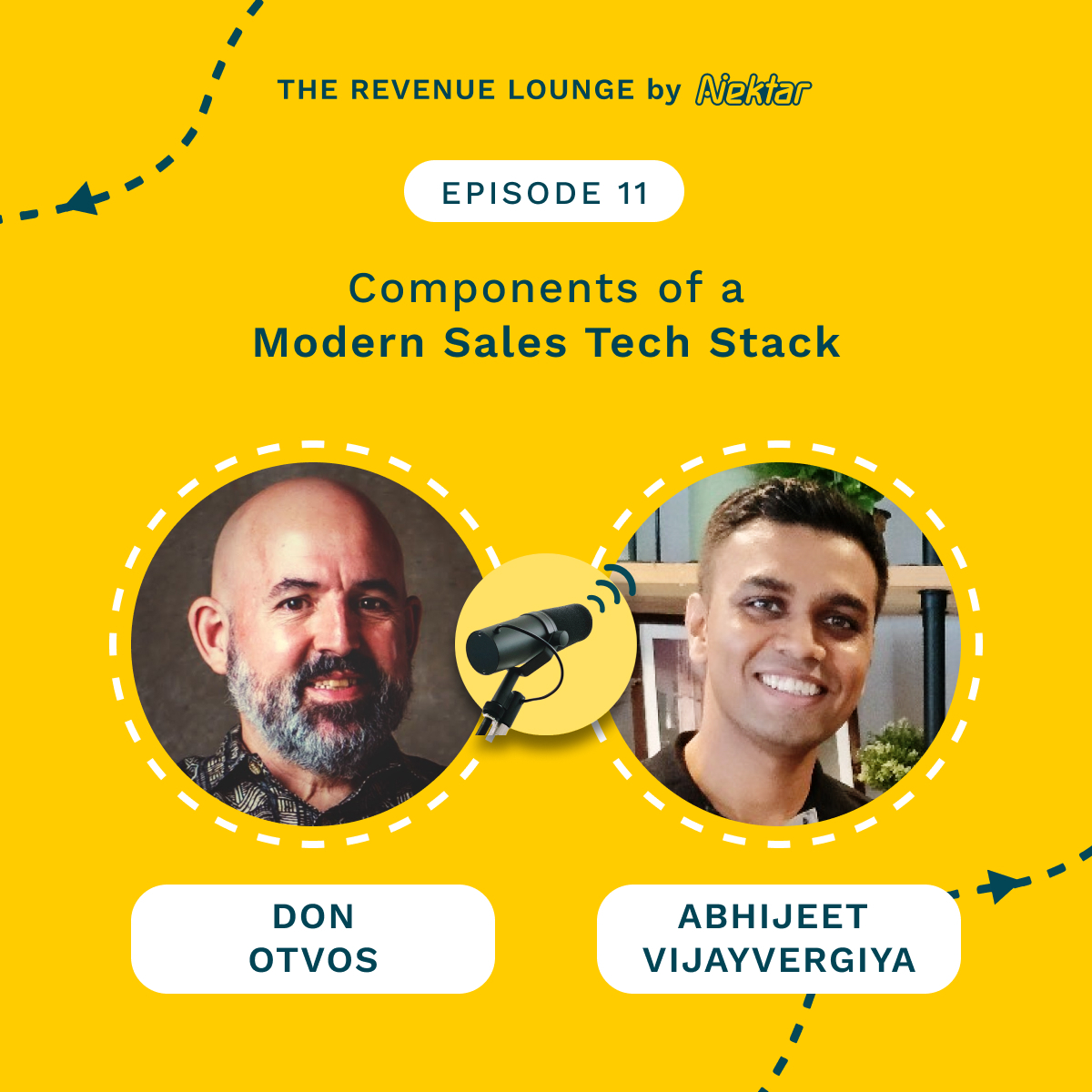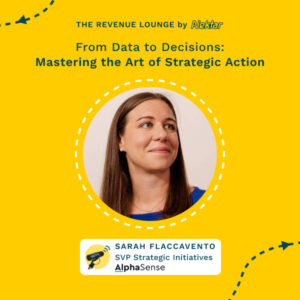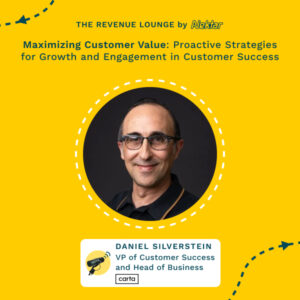Ep #6: Building a GTM Data Governance Framework
October 19, 2022
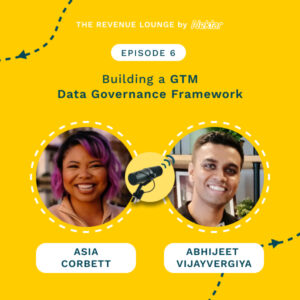
About
The Revenue Lounge
The podcast covers stories from leaders across RevOps, Sales, Customer Success, GTM, Data and Marketing about what drives these functions and what advice they would share with our listeners. With 3 seasons recorded, the podcast currently features 50+ enterprise leaders in the B2B SaaS domain. Tune in to hear from the best in the business
Data inefficiencies continue to plague organizations. Inaccurate, stale and missing data have made companies lose as high as 30% of their [annual revenue.
Clean, reliable and trustworthy data is the key to making GTM efforts successful. The significance of clean & unified data increases even more as organizations scale and add more tools to their revenue tech stack.
But how can RevOps teams carry out this critical system audit?
This episode discusses data integrity and its significance in running a tight GTM ship.
We have Asia Corbett, Senior Revenue Operations Manager at Bread Financial to guide us through this topic. She is one of the top leaders in the Revenue operations space and has helped several RevOps teams break data silos and run predictable and repeatable revenue engines.
Let’s hear it from her!
Want to learn more about Nektar? Talk to our team – https://bit.ly/3MDa52H

[00:00:00] Hi, welcome to the Revenue Lounge podcast.
[00:00:03] In today’s episode, we will discuss how data integrity and its significance in running a tight, GTM ship. Clean, reliable, and trustworthy data is the key to making GTM efforts success. The significance of clean and unified data further increases even more as organization scale and add more tools to their revenue tech stack.
[00:00:23] But how can a revenue operations team carry out this critical system ordered to find out this data in efficiencies and leakages? Let’s explore further. To do that today, I have Asia Corbett Senior Revenue Operations Manager at Brett Financials. She’s one of the top leaders in the revenue operations space and has helped several Revs teams break data silos and run predictable and reputable revenue engines.
[00:00:46] Welcome to the Revenue Lounge Asia. We are very excited to have you on board today.
Yeah, thanks for having me.
Yeah. Asia, to get started, why don’t you tell a little bit about your current role at Redfin? Yeah, so I’m a senior [00:01:00] manager on the revenue operations team. I support sales and our solutions team.
[00:01:05] We have, you know, another senior manager who supports other, other revenue teams. So we’re lucky that way that we have some dedicated resources to, to move around the departments. And a lot of what I do is process work, project management. A lot of systems work still, so, and. And data we know is very important to, to that.
[00:01:31] Yeah. And that, that looks like a sizable team with a lot of process already in place. So we’ll love to dig deeper, but before we go there, we’d love to learn from you and discussion we ask everyone on the show, What is Revenue Operations? How would you define it? Yeah, so Revenue Operations is the discipline that supports revenue generating teams.
[00:01:54] Their processes, their systems, like the tech stack, reporting, [00:02:00] analytics, and enablement. So all of those, those four pillars together really drive your revenue team’s ability to. Bring in more revenue faster. That’s how I describe it. Yeah. Beautiful. And yeah, it’s becoming an integral part of most organizations and a lot of studies that have published how having a revenue operations team can increase your revenue or increase productivity.
[00:02:25] So with you on that, on, on the role that this team can play, coming to your story, right? I mean, how did you get into revenue operations? So just walk us through, uh, your story. Yeah, so I started my career in finance. I thought, you know, I wanted to go that down that route, be a financial analyst and climb the corporate ladder in corporate finance.
[00:02:46] And I started getting into these sort of tangential financial roles. So, An operational element to what I was doing. I was looking for ways to [00:03:00] like automate my work and, um, build some processes that were repeatable and scalable, just like, you know, for my day to day. Um, and then I started getting into operational.
[00:03:12] Roles, business operations, sales operations, marketing operations. And I really like fell in love with that type of work, that cross functional problem solving. Where is the process broken and how can we fix it so that you know the teams can re do their jobs. Uh, so I worked in a couple of different industries, different size companies, but I, I really found my love for operations kind of early couple years after the finance staff.
[00:03:42] I’m like, you know, um, this is the direction I wanna go. Go to market operations, business operations. Um, and now today that’s revenue operations, kind of the catchphrase. Trendy, you know, thing. But, uh, , it really, it, you know, [00:04:00] my, like my business operations experience covers a lot of what revenue operations is today.
[00:04:05] Business operations is just a broader umbrella. , um, of, of stakeholders you support. So yeah, I guess, I don’t know. It’s been like seven years now and I love it. Yeah, I, I, I believe so. And I think you got this interesting angle of approach from finance to revs. That’s, that’s quite interesting. And as finance professionals generally data become very important, right?
[00:04:29] I mean, they deal with data day in and day out, and, and that’s also important for revenue operations. Uh, in fact, it can illuminate a lot of. Right. But if data is not good, it’s like garbage and garbage out. Right? Absolutely. So this brings me to the next question around the data nightmare. In fact, that’s come up in our conversation with other rev ops leaders who have been on this show before.
[00:04:50] How bad data can create blockages in terms of, um, making Rev Ops function successful? So as a ops professional, what are the biggest data [00:05:00] challenges you have personally encountered? What have been these hindrances, like when you have worked on your revenue roadmap before? Yeah. So I think one of the biggest gaps, challenges, issues, problem that affect revenue operations teams in terms of data, it’s like a lack of a data governance.
[00:05:21] program strategy, infrastructure, cuz that really sets the groundwork for how you’ll build, you know, your systems, how you’ll map integrations, how you’ll report on certain things. So that’s like really the foundation with, that’s like your map. That’s how you, you’re like, okay, we’re gonna map these fields in Salesforce, in the HubSpot, and understanding which one, what, um, what the definitions are.
[00:05:47] Critical. What we don’t need to map, how do we handle duplicates? Right. So I think that the, the biggest problem is that the lack of strategy around data for go to market organizations, because [00:06:00] data governors talked a lot about in like engineering and that world, but not so much in ours. It is more now, but a second thing would probably be missing data.
[00:06:11] So there’s an element of, you know, it’s like manual versus automated. What information is our, our revenue teams having to manually enter into the system. And if they don’t do that, or if they do it incorrectly, that affects the data integrity of your, you know, your operations. D. So, so all of those sort of data health things are secondary to that foundation?
[00:06:37] Yeah, I think they’re, uh, the very relevant reasons why a lot of automations struggle with getting best out of their systems and tools because the underlying data that gets generated is like incomplete or it’s messy. Um, so that brings me up discussion around how one can. All of this, right? I think you’re posted on LinkedIn sometime back, and I think that post became very [00:07:00] popular.
[00:07:00] I noticed there are a lot of like likes and comments and discussions going around, so it was around, you highlighted importance of system audit, right? How system audit can be one of the most critical things a revenue operations professional can do. So can you tell us what the system audit entails and how it can help establish a data governance framework?
[00:07:18] Yeah, so the way that I think about a system audit is all of the tools in the tech stack that your revenue operations team owns should go through an audit. So, Whatever cadence. It could be quarterly, it could be biannually, it could be once a year. You go through and check all of your fields. You go through and check complete completeness of data, check the integrations.
[00:07:48] So, you know, many companies use a CRM as a source of truth and a lot of different systems funnel data in. So not only do you need to, uh, audit your, we use Salesforce, [00:08:00] but you also need to audit the tools that are pushing data. As well because where is data coming into those tools from? So start with a Google sheet.
[00:08:09] Write down your systems. Write down the critical, I like to call ’em like the fields, right? Cuz that’s your data. The data’s house in these fields. Write those down and then check if you still are still using some, like over time you can inc accrue tech debt, right? Fields that you don’t use anymore because the business definition doesn’t make.
[00:08:32] Um, so that’s the first part. The second part is the system automation piece. So CRM has workflow automation. You can build your marketing. Auto automation platform has different workflows you can build, right? So you wanna make sure that all of those are working properly, you still need them, right? So that’s the second, second part.
[00:08:55] Third part is documenting their results. And then duplicate management is [00:09:00] another big part of that. And some, there are a lot of tools that you can use. You can, um, use reports. You can do it manually, but like duplicate data also causes an issue. So that’s a. Fourth component of this audit and then afterwards put everything together in a nice little summary.
[00:09:20] Um, and then you can show that to be your team and say, Look at these things. Here’s how these things are gonna impact our business processes negatively. So we need to fix them. Interesting. And what would be the frequency of such audit? What would you recommend? How often teams should do this audit? Yeah, I mean, it’s tricky because.
[00:09:43] Depending on how big your team is and how much resource you have, you may not be able to do this frequently, but I’d say at least every six months you should take a look, kind of a deep dive at your systems and [00:10:00] all of the, the pieces in your data governance framework that you’re doing in this audit. Uh, if you’re lucky and you have more resources, you have a team and maybe you have a system.
[00:10:09] Admin quarterly makes. Mm. So give us an example of what kind of findings you’re typically seeing after a successful system audit and how that can be then put it on a roadmap to introduce and in terms of improvement. Yeah, so for example, I was doing a, an audit in HubSpot. Right, So you can see how many duplicates you have, and then from there you’re like, Okay, what do we do with these duplicates?
[00:10:36] Do we keep them? Do we delete them? How do we delete them? How do we determine in the future what it constitutes a duplicate? Um, second part of that and the marketing, our marketing automation platform is all right. How many contacts don’t have email addresses? We can’t reach out to them if they don’t have email addresses.
[00:10:58] We can’t. We can’t [00:11:00] get their data. So what do we do with those contacts? Do we keep them and, you know, clutter up our database or do we delete them? And part of that data governance framework is having, you know, some standard operating procedures around how to handle that because the, the impact of that is marketing can’t run their campaigns, right?
[00:11:21] If they don’t have people to reach out to, sales can’t reach out to them. , So do you wanna bog down your system and pay extra for marketing contacts? So I don’t have email addresses? No. Right. Uh, that’s, uh, one example. It is a great example and very practical one, Um, mean duplicate data or missing data. I mean, that’s a very common problem we keep hearing about across.
[00:11:44] I think it’s a global problem across all CRM systems. Bang on there. So how does this data audit help in making a GTM funnel stronger? Yeah, well, when you have accurate data, you can make informed business decisions and it helps inform your go to market strategy, [00:12:00] right? So like in that last example, You can’t run any marketing campaigns if you don’t have contact information that’s just sitting in your marketing automation platform.
[00:12:10] Right. And it could be mixed in with other data. And if there’s not some, you know, governance around that, your marketing manager goes in as like, Okay, I’m just gonna pull this list and I’m gonna, you know, put ’em in a campaign or a sequence or whatever. Um, and then what about all the people that fail?
[00:12:26] Cause they don. Email addresses, right? And causes your system admin to be like, Oh, what happened? Right? There’s some downstream impacts there. Um, so it’s, it’s really about giving and enabling, empowering your go to market teams with accurate. Clean, good quality data so that they can make good business decisions.
[00:12:50] Nice. That’s very, very interesting. So what do you suggest should be the first step? Right? I mean, if I’m part of an organization where we haven’t done an audit before, so where [00:13:00] do we get started? I mean, it’s, it. Sometimes it can be overwhelming, right? With the number of tools that we have got and the volume of data that exist and the different processes we follow.
[00:13:08] So what would be the first step in terms of getting started there? Yeah, definitely create a project plan , so you have something to keep you accountable. There’s lots of templates on the internet, but you know, I just start with a Google sheet and I literally say, Okay. What are the things I need to do in this audit?
[00:13:26] I need to look at the field. I need to maybe look at and start with one system. Okay, I’m gonna say Salesforce. Start with fields, objects, page layouts, profiles, um, automation. So process builder, workflow, rules, flows. Start there and just start. I mean, literally put it together. Start going in, poking.
[00:13:53] Document all your stuff as you go along in the Google sheet and then move on to the next one. [00:14:00] The, I Live and Die by Google Sheets for these things. I have used a lot of project management tools, but Google Sheets is free. It’s easy. It’s like you can organize stuff very nicely and you can summarize things for people.
[00:14:14] Um, Salesforce has some reports that you can pull that will tell. Fields on all the objects and the API names and all of that stuff. So that’s a good basis for a data dictionary. So, you know, add a column and you can add a business definition to your field. So you know, later at the end of your audit, you can say, All right, these fields mean this to the business.
[00:14:40] Right? That end user, that definition is there for you to see. That helps you too. When you make changes later and you’re like, All right, we’re rolling out a new process. We need to create some new reports, or maybe we need to automate something. You have the results of your audit there, so you’re not like starting from scratch.
[00:14:59] Right. And you [00:15:00] know, I’m not gonna break something hopefully . Interesting. So let’s expand our horizon beyond the revenue operations team, right? So there are other stakeholders as well, like the leadership or VP of sales, VP of demand, gen, VP of Customer Success, and VP of whatnot, right? So like multiple stakeholders as well.
[00:15:20] Uh, Are getting serviced by Revs team. Right. So what role do you think, uh, some of these other stakeholders can play in getting to, uh, the reliable GTM data goal? Yeah, so on the leadership side, it’s really about the culture, right? Of supporting revenue operations in this endeavor because should they care about the data governance framework, But the reality is they probably are not gonna care about it to the extent the revenue operations teams do.
[00:15:53] But what leadership can do is create a space so that the operations teams can focus on it and say, Okay, [00:16:00] yeah, I understand it’s important. . So how can I make sure that as a leader, the revenue operations teams have space and time to dedicate to this effort? Right? And that’s, you don’t have good data. You can’t run marketing campaigns, you can’t run marketing campaigns that affects your funnel.
[00:16:17] If you don’t have good data, you can’t forecast, right? You can’t forecast, can’t build a scalable, repeatable sales motion. Don’t know what your pipeline’s gonna be or what, what money’s gonna come in. So if you come at it from that angle, And then have leadership be really good executive sponsors, if you will, of this effort for revenue operations.
[00:16:40] Um, I think that’s how they can play a role in, in this getting to, um, that desired end state. If like data, I feel like someone used the word nirvana, like data nerv. Some, some thought leader and I thought that was a good, good way to put it cuz we’re, we’re definitely [00:17:00] not there yet. . Yeah. Yeah. No, there’s a long way to go.
[00:17:03] Um, but yeah, you’re right. Those are some interesting ideas on how you can even involve leadership. Right. In terms of sponsoring this, cause there’s one question that I keep getting from a lot of DevOps folks we speak with that they want to spend time on some of this system audit, so they would want to invest into like getting their data more reliable.
[00:17:21] The problem that happens with bad data is like Rev is generating insights and reports out of this data, and they are the ones who are bearing the brand because the, the data that they present to these stakeholders is not reliable. So it’s like obviously, uh, a trust factor also that plays in. Right, and you can’t show a good report or, or an insight.
[00:17:38] If the data is not great. Right. But the thing is, as you mentioned, some of the leadership folks don’t care about a data problem. I think Rev cares about it. So you did touch upon a point on how you can probably create more like a, a business case internally for your executive sponsor, if you may call it.
[00:17:53] But how do you get the cross functional leaders aligned? Because they are also benefiting from this better data, but they’re very busy with doing [00:18:00] their own things and they’re busy with their own o. So how are you typically encourage to involve them in this kind of a project so that you can get some of these resources or bandwidth from them as well?
[00:18:09] Yeah, I mean the, the key there is first of all like having a regular touch base with your, you know, go to market leader. So a weekly sync that’s dedicated to like operational stuff. Like, okay, this is my weekly sync with customer success, and we talk about these things in our customer success weekly. As it relates to like operational work, right?
[00:18:35] How is, is everything working in the system? You’re reporting? Is it, you need to roll out a new business process. So having that regular touch base is important. And then you talked about the business case, It’s like, yeah, you just have to put that together, like put a slide or two together with, here’s the problem, here’s what I’m proposing to do to fix it.
[00:18:58] Here’s how it’s [00:19:00] gonna impact our business for the better. If you can put something together in a concise, like short visual format, that’s very consumable for executives and you just have to keep socializing it, right? Like, here’s how your, your customer success reporting is gonna be more accurate, you can better forecast churn if we do this, if we clean up sales.
[00:19:25] Same to marketing. You can have better campaigns if we take care of all of these duplicates. Here’s how that works and should be kind of high level. I mean, they don’t want to get bogged down into the details of your system on it, but putting together , putting together business cases can be like an art.
[00:19:44] Yeah. So Mo, moving on to the last question in our first section before I move on to rapid fire. So this is about the future, right? So let’s try to understand Asia’s view of the future of Rev ops. Was it trajectory you see taking over the next five years? Yeah, so [00:20:00] I actually see Rev op becoming, I mean it already is, but becoming very data focused.
[00:20:10] So, and what I mean is in a lot of business operations roles, you’ll see SQL as a requirement to be in the role. And I, and I , I’ve been seeing a lot more like technical skills in, in that like more data, technical data skills. What I hope is that, The discipline continues to evolve to understand that data is one piece of revenue operations of an operational role, and that the process part, the process pillar, is really the foundation for all of that because you didn’t even get to the data without understanding what business process are we supporting strategy, what’s the go to market strategy?
[00:20:59] What are the [00:21:00] business processes that support that strategy? What are the systems we’re using? How do we build those systems? How do we configure Salesforce? What data points do we need to ingest into Salesforce to make all of that happen? You don’t understand that you can’t get to the data, so I see a lot of emphasis and a lot of focus on like being able to build Tableau reports and like, yes, that’s good, but my hope is that the discipline continues to incorporate more process focus.
[00:21:32] More project management principles, more agile methodologies into the revenue operations world, cuz that’s really the foundation. Nice, Nice. That’s it’s a very interesting new future. And yeah, Rev is definitely the power engine for any of the modern go-to market teams. Thanks are sharing that Asia. So let’s move on to the fun part, the rapid fire cushions, right?
[00:21:56] Yeah. So tell us about your favorite book. Ooh, My [00:22:00] favorite. Okay, , I haven’t read this book in a while, but it’s called Manhattan Hunt Club by John Saul, who writes like psychological thrillers. And it’s about, in New York City, in the subways, there’s these abandoned subway tunnels and there’s a whole, you know, community of people living down there.
[00:22:19] Um, and in this book particularly, part in particular, these aren’t like good people and it’s kind of, kind of messed up. So what they do is they go to the surface. And kid people and put them in the sub, Throw them in, in those Amanda and Subway tunnels and hunt them. Wow. And so this, this particular story is a guy who’s trying to get out, like he got kidnapped and then he’s trying to get out of these subway tunnels.
[00:22:44] And these people, you know, they live down there. They are adjusted to being down there and they know the tunnels really well. That’s like one of my favorite. I can’t think I read, obviously the Harry Potter series is, Oh, sorry. I grew up on, in on that, that, that’s [00:23:00] probably, yeah, that, that’s what comes to mind.
[00:23:01] Those are, those are fiction books. Those aren’t business. I’ll check that out. Yeah, yeah, no, good to get to hear somebody talk about the fiction books as well, because I keep getting responses on business books. But yeah, we have like variety of taste and I love fiction myself, and I’m gonna check out this.
[00:23:18] I’ve been to Manton many times and I understand what you’re talking about, abandon and subways, so I’ll definitely check it out. It also sounds like a movie script. Not sure the movie’s already made as well. I, It would be a good movie if it doesn’t already exist. Yeah, Yeah, Yeah. . All right. So what’s the favorite part of working in Rev?
[00:23:37] Oh my gosh. I love being able to work across different teams. I get exposure to a lot of different people and ideas and learning. That’s my favorite part. Hand dance. Yeah. And what’s, what’s not so good about working in Revs? What’s the least favorite? Well, right now, the, the, [00:24:00] the. Challenge is a cultural one where revenue operations is still getting adopted in a lot of companies.
[00:24:06] And so having everyone really understand that those four pillars and how those four pillars drive all the work we do, that’s probably the most challenging part cuz it’s when you’re trying to get resources and build a team and get budget, those things are really important for the leaders to understand like, okay, what is it that you actually do?
[00:24:26] And it’s not just Salesforce work, it’s not just building. Salesforce automation or building Salesforce reports really much more than that. So that’s a, it’s kind of a pain, but culture takes time to change. So I’m optimistic. . Yeah. All good things take time. So what, what’s about the four pillars? I know you did mention the four pillars, so in a, in a quick summary, can just recap that for us again.
[00:24:52] Yeah. So process, systems, reporting and enablement. Like the easy one and the process. Our [00:25:00] business processes that support, you know, go to market strategy systems are the, is the tech stack that supports the processes that support the go to market strategy. Reporting is all the, the reports, pipeline reports, marketing reports, CS CU customer success.
[00:25:15] Um, and then enablement is the training and empowering the team. So all of those things kind of stack, I mean, it’s this way, right? They’re process systems, data reporting, enablement process being that bottom pillar, the foundation. It’s like a house. The processes, the foundation of the house. I’ll probably remember it as po.
[00:25:35] P r s. So I’ll probably bring in enablement before just to remember the four pillars. But yeah, thanks for sharing that. So moving on. Who’s your favorite Rev leader you personally look up to and why? Oh, I really look up to Hillary. She’s on the sales side, but you know, it’s part of the Rev umbrella and she’s just done such amazing work and things in her career I really admire and look up to her.
[00:25:59] [00:26:00] She’s so smart. and just. Love to see other, you know, women leaders in the space. Another one I have been, look, I looked up to her for a while as Rosalyn and she’s like, actually one of the first people I was like, Okay, who knows about revenue operations besides me? Like who’s out there? Right. And she’s one of the first people I started following on LinkedIn and yeah, she’s also another brilliant.
[00:26:28] Those are my two like heroes. Yeah, no, they are heroes through a lot of us. Rosalyn has been on the show. We should get Hillary as well. Thanks for recommending her. Okay, so what’s one advice you receive from someone that has stayed with you? Um, embracing uncertainty, especially in our roles. There is a lot of that and you’re not always gonna know what’s going on and you’re not always gonna have a plan.
[00:26:52] So being able to like know that, understand. You know, internalize that and then work with people [00:27:00] around you to get certainty where you can and clarity where you can, but understanding there’s always gonna be some level of something that you don’t know. Like you can’t know everything all the time. So, yeah, I forgot who told me that, but it was like, yeah, being comfortable with the unknown and uncertainty.
[00:27:16] Yeah. Yeah, definitely. Yeah, dealing with unknown is a very important skill. I mean, if you can like be comfortable in, in an unknown situation, I think you’ll definitely excel. So thanks for sharing that. I love that advice. Last question. It’s an important one, like a lot of our listeners on this show are folks were starting their career in revs, or were trying to break into it.
[00:27:38] So what’s the number one advice you’ll give to. As they start their career into DevOps, don’t give up because sometimes it feels like thankless work, especially early on, and also invest in your project management skills. It’s hands down, one of the most, I wish I’d known that earlier, how to build a project plan, right?
[00:27:59] Like. [00:28:00] Something like a system audit and you’re like, Where do I start? Start with a project plan. Even though you’re building stuff and you’re solutioning, you’re doing a lot of system work reporting, you would have to work with a lot of different people. So understanding change management, which is part of the project management.
[00:28:15] So, um, you know, there’s like YouTube, there’s Google, there are courses and wherever and whenever you can. learn about that. And then the other one I wish I had started looking into earlier was Lean Six Sigma, which is a process improvement methodology that’s very, very, very applicable to the kind of work that you do in revenue operations.
[00:28:37] So outside of like Salesforce certifications, outside of that, the other part, like the process pillar, the skills that you will build that invest. Yeah. Awesome. That’s great tactical advice. I’m sure our listeners are going to really love it. Thanks again, uh, Asia for coming on the show. This brings us to the end [00:29:00] of our conversation.
[00:29:00] It was lovely chatting with you as always, and you shared some really good advice for everyone. Thanks again. Yeah, absolutely. Thanks for having me. Good luck to everyone out there.

Ep #1: Navigating the Downturn with a Hyperfocus on Productivity
Listen Now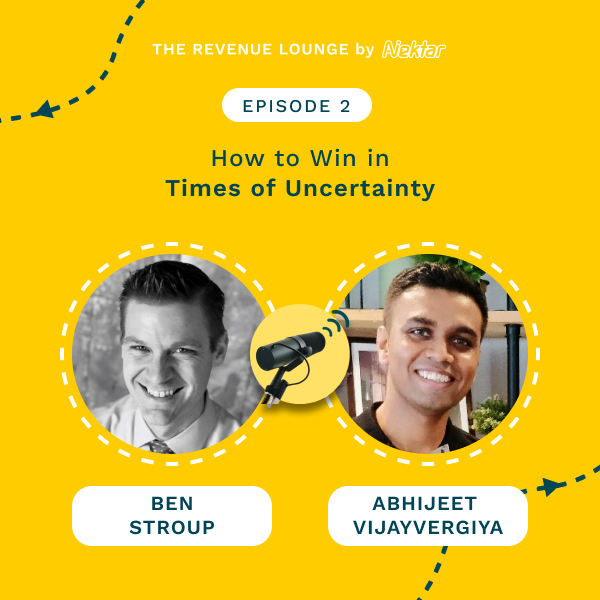
Ep #2: How to Win in Times of Uncertainty
Listen Now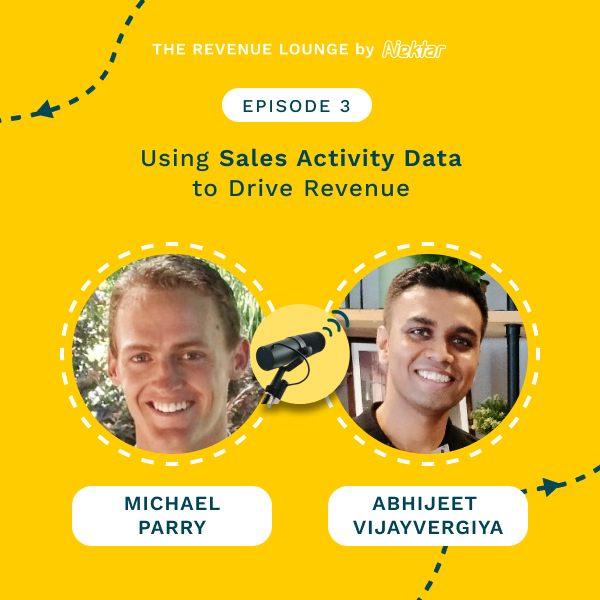
Ep #3: Using Activity Data to Drive Sales Productivity
Listen Now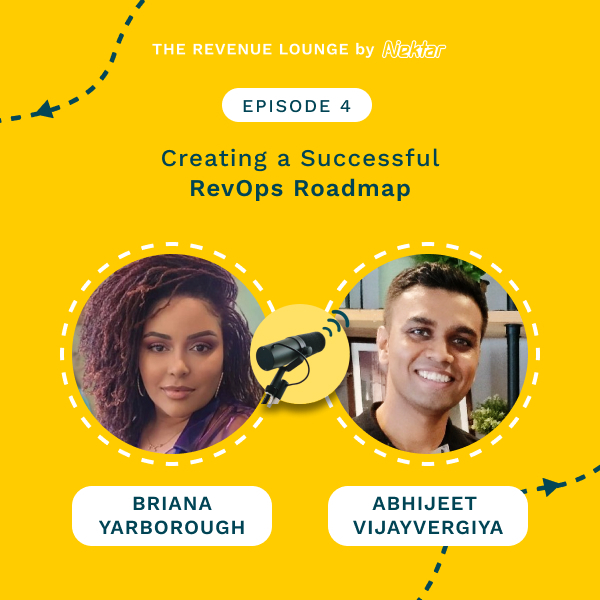
Ep #4: Creating a Successful RevOps Roadmap
Listen Now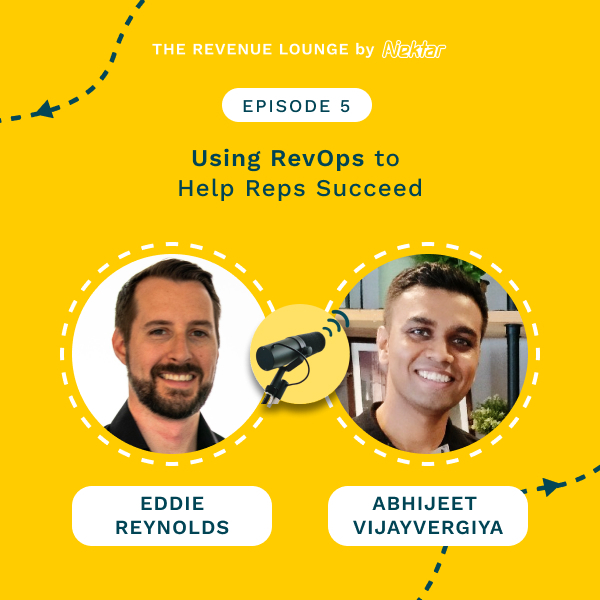
Ep #5: Using RevOps to Help Reps Succeed
Listen Now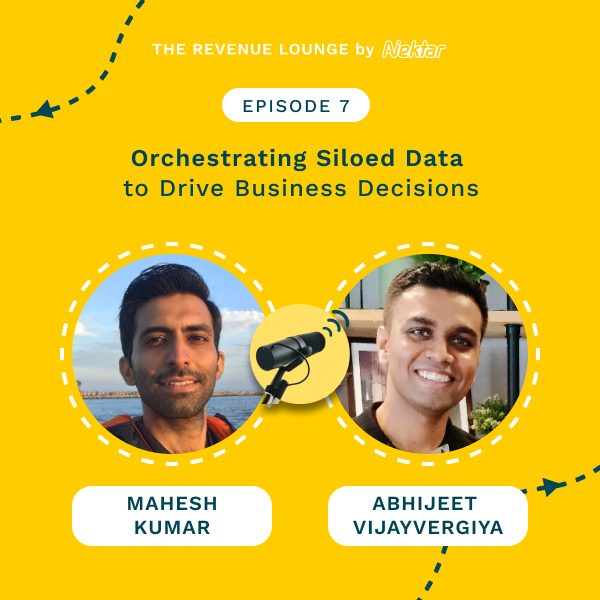
Ep #7: Orchestrating Siloed Data to Drive Business Decisions
Listen Now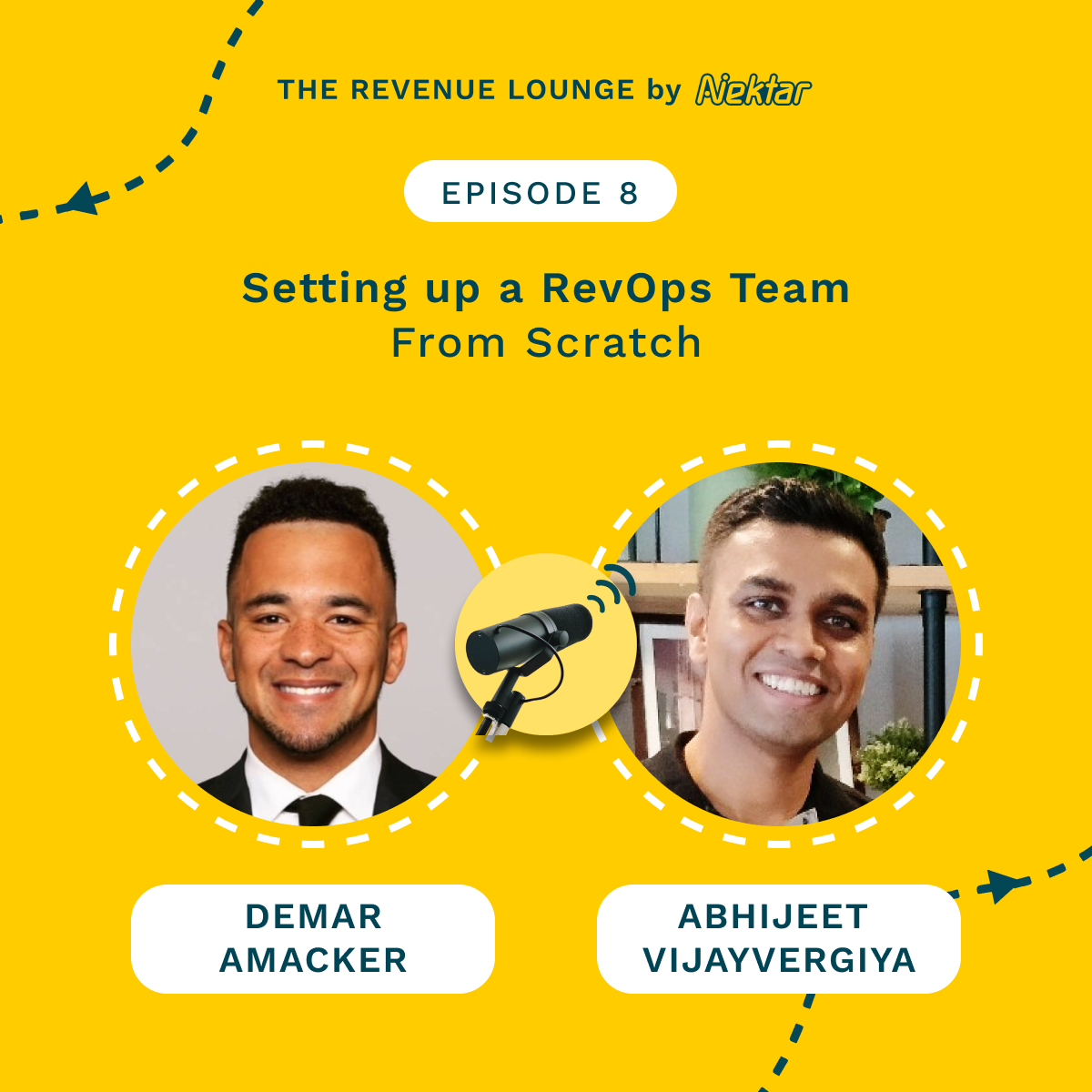
Ep #8: Setting Up a RevOps Team From Scratch
Listen Now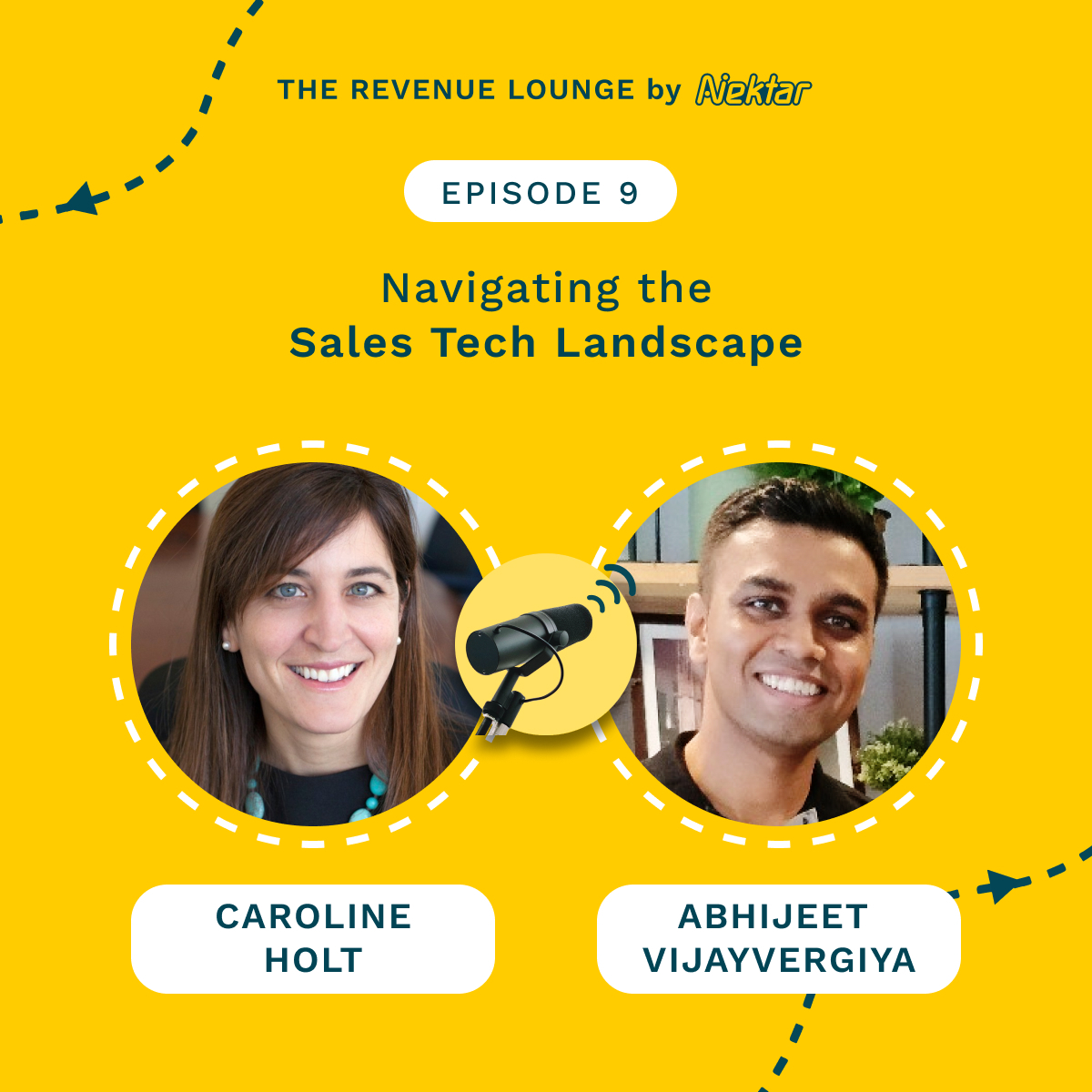
Ep #9: Navigating the Sales Tech Landscape
Listen Now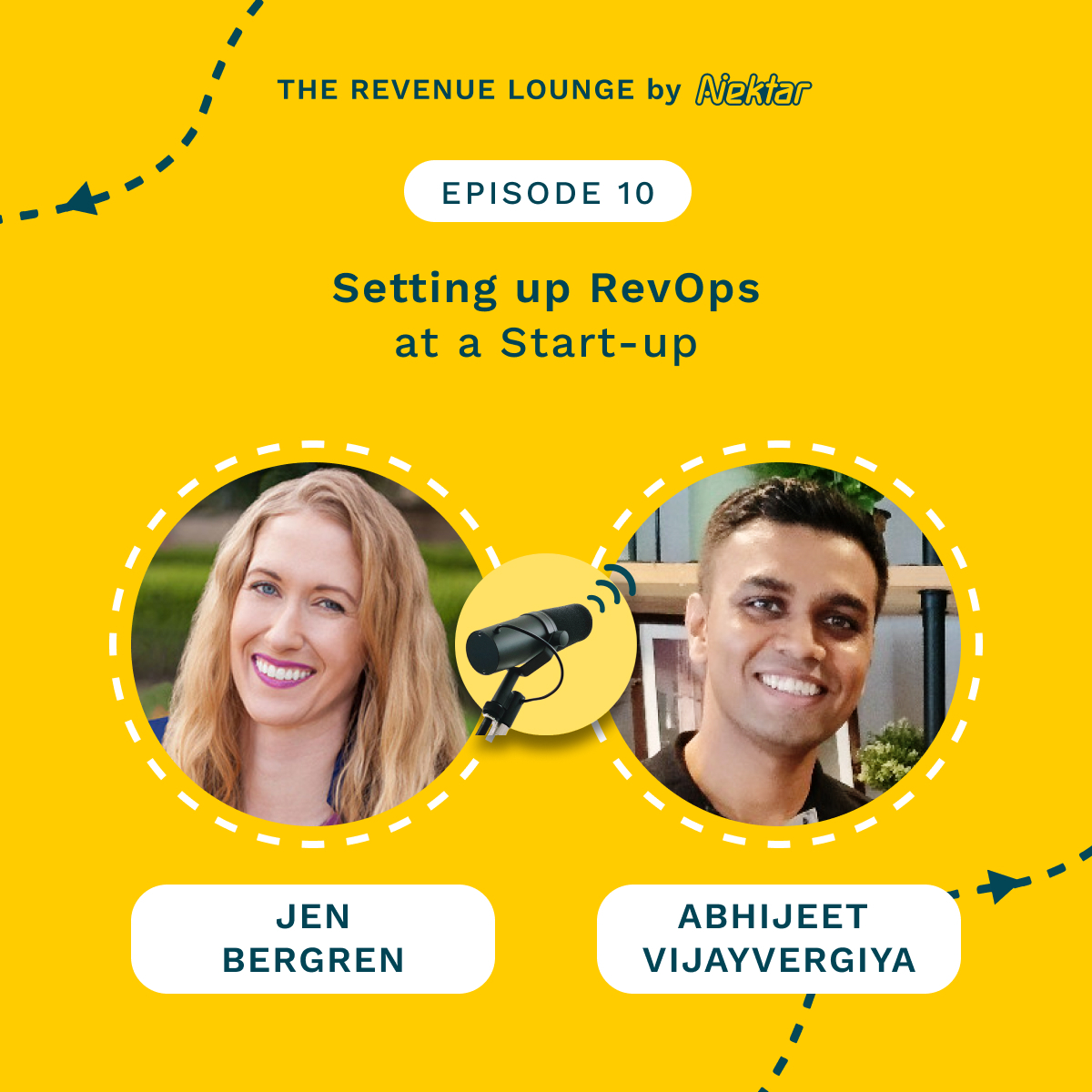
Ep #10: Setting Up RevOps at a Startup
Listen Now